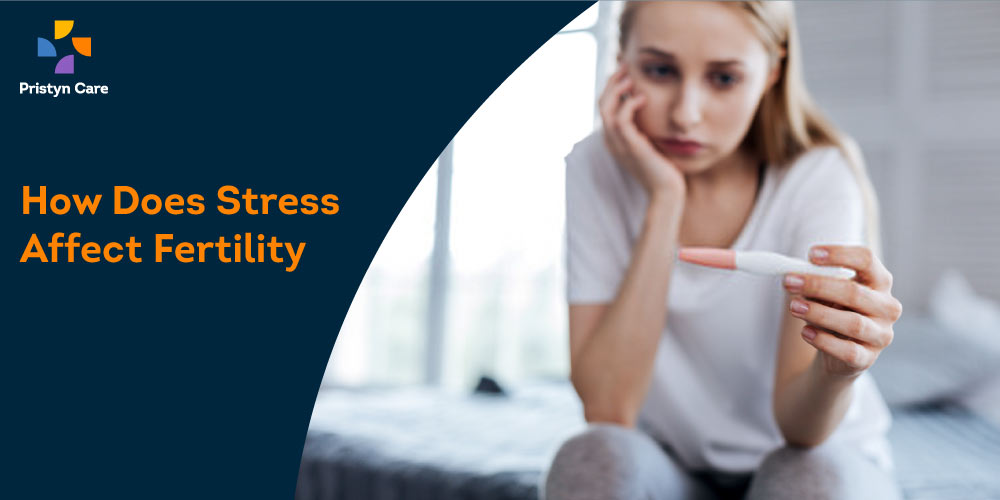
Among so many individuals and couples who step in at Pristyn Care to find solutions to their reproductive problems, there’s hardly anyone who is not dealing with stress. The stress of not being able to conceive, the stress of not being able to cope up with the difficulties, the stress of not knowing what’s next, and so much more. If you know someone is trying to get pregnant but failing, you must have heard people coming ahead with the easiest advice, “Relax! Everything will be fine.” But the whole thing is a little more complex than it sounds.
Table of Contents
Understanding Stress
Stress, in very simple definition, is emotional or physical tension. It is the inability to cope with emotional or mental pressure and the feeling of being overwhelmed due to these.
Globally, 33 percent of people report suffering from extreme stress that affects their overall wellbeing and health.
- 77 percent of people experience stress that affects their physical health.
- In 73 percent of people, stress impacts their mental health.
- 48 per cent of people have trouble sleeping due to stress.
- Major causes/ triggers of stress include money, worklife, family responsibilities, relationship issues, job stability, personal health issues, and personal safety.
Medical practitioners are yet to confirm how stress in itself makes it difficult to get pregnant. But what is medically proven is that stress-related factors can make it hard for one to conceive.
How does stress impact fertility?
The relationship between stress and infertility has been a matter of debate for ages. Women with infertility report heightened levels of stress. This means it is clear that infertility causes stress. What is not very clear is whether stress causes infertility or not. It could also be – infertility causes stress, and stress affects infertility. The process keeps ongoing.
People with infertility often struggle in silence. In most cases, they report feelings of anxiety, depression, isolation, mood swings and loss of self-control. Despite the high prevalence of infertility (1 in every 8 couples deal with infertility), people dealing with the issue do not open up their story to their friends and family. This largely affects their mind and increases their psychological vulnerability. They experience tremendous emotional turmoil due to their reproductive problem.
The bigger question here is – does stress cause infertility or infertility causes stress?

The science behind stress and infertility
Studies have found that stress directly impacts a person’s ability to get pregnant. It was revealed from a study that women whose saliva had a high amount of alpha-amylase (stress enzyme in the body), took 29 per cent longer time to conceive than those who had less. (Also read: Tips For Handling Anxiety During IVF Treatment)
According to Domar, Infertility Specialist and Director of Mind and Body Services at Boston IVF, women dealing with infertility tend to be very less involved in sex with their partners. They resort to smoking, drinking alcohol and caffeine consumption which does not improve their odds but relatively affect their infertility problem.
“We know now that stress hormones such as cortisol disrupt signalling between the brain and the ovaries, which can trip up ovulation,” says Sarah Berga, MD, an infertility specialist and vice-chair of women’s health at Wake Forest Medical Center in Winston-Salem, N.C.
According to the CDC, usually, there is a physical reason such as ovulation problem, low sperm count, or a blockage in the fallopian tubes behind infertility. But as days roll on, and conception does not happen, stress kicks in.

“Women struggling with infertility have the same levels of anxiety and depression as women diagnosed with cancer or HIV,” Domar says. As a result, a vicious cycle starts. (Also read: Why am I not getting pregnant?)
In a large Danish study of 42,000 women who underwent ART treatment and were screened for depression prior to treatment, 35% screened positive. In another recent study of 174 women undergoing infertility treatment, 39% met the criteria for major depressive disorder. In one of the largest studies to date, 352 women and 274 men were assessed in infertility clinics in northern California. It was determined that 56% of the women and 32% of the men reported significant symptoms of depression and 76% of the women and 61% of the men reported significant symptoms of anxiety. (Data source: NCBI)
How does stress impact pregnancy outcomes?
Infertility specialists worldwide are of the opinion that stress-related factors can highly alter the success rate of pregnancy. Reports of Artificial Reproductive Techniques (ART) state that the more distressed a woman is during her treatment, the lower is her pregnancy success. High levels of stress during pregnancy may cause high blood pressure and heart disease. Stress increases the chances of having a premature baby (born before 37 weeks of pregnancy), a low-birth-weight baby (weighing less than 5 pounds) or a baby with birth defects.
Stress can alter your eating habits; you may either eat too much too little. These habits can cause gestational diabetes and preterm labor. Stress can affect your self-control and how you respond to certain situations. Many women choose to smoke and take drugs that can have serious health effects on them and their baby. An extreme level of stress even has the potential of causing miscarriage.

How to deal with stress during pregnancy?
You need to understand that the discomforts of pregnancy will not last forever. The best way to begin your process of stress management during your reproductive journey is by seeking guidance from an experienced doctor (gynaecologists/ infertility specialists/ psychiatrists).
- Stay healthy. Stay physically fit. Eat well. Stay hydrated. Get plenty of sleep. Practice exercise and yoga.
- Try relaxation activities like meditation. It can help in managing stress and help you with a healthy pregnancy.
- Cut off activities that are not essential for you.
- Take childbirth education from experts.
- Get involved in peer groups. Meet like-minded people who are going through the same. Seek advice from them. Share your story with them.
- Have your trusted support network. Make a community that you believe can help you in this tough journey.
- If you feel your depression and anxiety is getting too much on you, get treatment as early as possible.
- Figure out what triggers your stress. Find out ways to keep the trigger away from life. (Also read: What Can Men Do To Support Their Wives During IVF?)
Reduced stress is good for your fertility. Finding ways to minimize stress while seeking medical help can take you a long way. Here are some easy effective stress-reducing techniques that are recommended to fertility patients and pregnant women:
- Guided imagery
- Acupuncture
- Collaboration with stress management experts
- Listening to music
- Massage therapy
- Mindfulness
- Progressive muscle relaxation
- Self-help books
- Cognitive-behavioural therapy
Dealing with stress needs professional help. If you know who is facing this challenge, do not go on to tell them to relax. Instead, suggest concrete and pragmatic ways to reduce stress. The goal of stress reduction is not to eliminate but to minimize the triggers.







